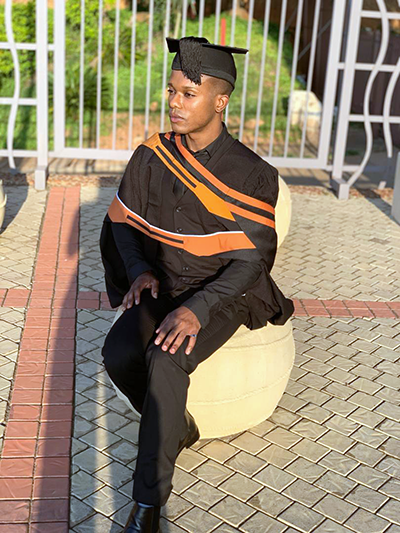News & Events
Unisa Political Sciences alumnus to head IAPSS research committee

Caption: Ian Fleming-Zhou, Unisa graduate and Chair: International Association for Political Science Students (IAPSS) Research Committee on Security Conflict and Crime
Ian Fleming-Zhou, a Unisa Political Sciences graduate, has been appointed the next chair of the International Association for Political Science Students (IAPSS) Research Committee on Security Conflict and Crime. The association caters for all political science students worldwide and aims to strengthen their academic profile by offering various opportunities for development. As the chair, Fleming-Zhou believes that the knowledge gained through his studies with the university influences his leadership traits and daily work activities. ‘I learnt to be committed, dedicated and disciplined.’
He says: ‘Distance education boosted my professional career as there wouldn’t be anyone chasing after me to submit assignments and meet deadlines. If one does not have the right work ethic, the process becomes challenging.’
Fleming-Zhou, who joined IAPSS in 2014 as a member, became part of the journals authorial board and wrote articles that covered all topics from nuclear diplomacy, cyber security, and foreign policy. Before he became the chair, he was appointed as a vice-chair in 2017.
Building a good rapport with lecturers in the Political Sciences Department and attending tutorial classes at undergraduate level encouraged Fleming-Zhou to achieve his academic goals. He has completed three degrees at Unisa, a BA in International Relations and Diplomacy, BA Honours in International Politics, and an MA passed cum laude. ‘I would also like to emphasise that I would not have asked for anything better than the supervision I got during my master’s,’ he says.
In his new position, Fleming-Zhou is learning a great deal about the workings of a multicultural organisation. He firmly believes that it is important to have youth leadership in the field. ‘I am constantly working hard to make sure the voices of the younger generation are not only prominent in international politics, but they are heard,’ says Fleming-Zhou. ‘I strongly believe that through this position, I have the resources and means to make it possible.’
‘Zhou is dedicated, independent, and also highly motivated’, says Professor Jo-Ansie van Wyk from the Department of Political Sciences in the College of Human Sciences. ‘As a student he was an avid reader, engaged with the relevant literature and strong theory. This made it wonderful to work with him as he passed with distinctions.’ she says. ‘His involvement in this organisation confirms his open-mindedness and realisation of the benefits of international cooperation and exposure,’ affirms van Wyk, who co-supervised Zhou’s master’s dissertation.
Van Wyk adds that they co-authored an article that was accepted for publication by the Asian Journal of Peacebuilding in 2020. ‘We just submitted another joint article to the journal International Negotiations.’
Now they are working on a third joint article where they have developed a new model, an amendment of Amira Galin’s model on small states’ use of time-delay tactics as an instrument to entrap a stronger state during diplomatic negotiations. ‘We argue that North Korea is very astute and analyse its operationalisation, looking at instruments of time delay as a tactic,’ says Van Wyk.
* By Lesego Ravhudzulo, Journalist, Department of Institutional Advancement
Publish date: 2020/04/15
